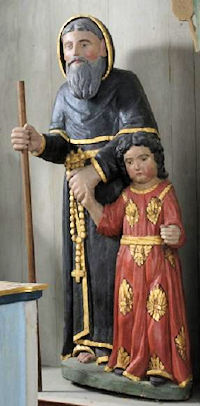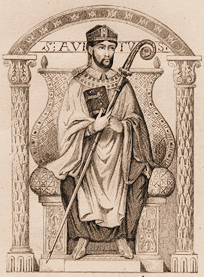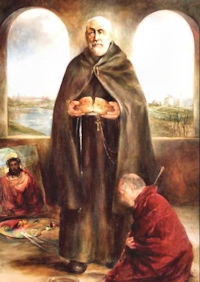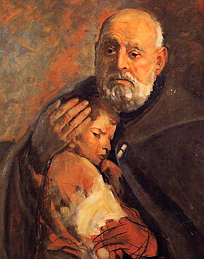Ordinary Time: June 17th
Friday of the Eleventh Week in Ordinary Time
Other Commemorations: St. Hervé, Abbot (RM); St. Avitus (RM); St. Albert Chmielowski, Religious (Poland) ; Other Titles: St. Harvey
» Enjoy our Liturgical Seasons series of e-books!
Gospel Verse, Mt 5:3:
Blessed are the poor in spirit; for theirs is the Kingdom of heaven.
Today St. Albert Chmielowski is commemorated in Poland. He was born in Igolomia near Kraków as the eldest of four children in a wealthy family, he was christened Adam. During the 1864 revolt against Czar Alexander III, Adam’s wounds forced the amputation of his left leg. His great talent for painting led to studies in Warsaw, Munich, and Paris. Adam returned to Kraków and became a Secular Franciscan. In 1888, when he founded the Brothers of the Third Order of Saint Francis, Servants to the Poor, he took the name Albert. They worked primarily with the homeless, depending completely on alms while serving the needy regardless of age, religion, or politics. A community of Albertine sisters was established later. Pope St. John Paul II beatified Albert in 1983, and canonized him six years later.
The Roman Martyrology commemorates St. Hervé (also known as Harvey, Herveus, Huva), who is one of the most popular saints in Brittany. He was born in a family of bards. Blind since his young age, guided by a wolf, according to legend, he led the life of a pilgrim. One day, however, he settled at Plouvien, then at Lan-Houarneau (Herwan or Hervé in Breton) where he dedicated himself to God to sing praises in the monastery he founded there.
The Church also commemorates St. Avitus, bishop and confessor, whose faith, labors and admirable learning protected France against the ravages of the Arian heresy.
St. Hervé of Brittany
 Saint Hervé is venerated throughout Brittany but we have few reliable particulars on him. His life was not written until the late medieval period. All we really know is that he was a hermit in Brittany, where he is still highly venerated and where Hervé is one of the most popular names for boys.
Saint Hervé is venerated throughout Brittany but we have few reliable particulars on him. His life was not written until the late medieval period. All we really know is that he was a hermit in Brittany, where he is still highly venerated and where Hervé is one of the most popular names for boys.
The story goes that a young British bard named Hyvarnion, a pupil of Saint Cadoc, lived at the court of Childebert, king of the Franks. After four years, desiring to return to his native land, he set off through Brittany, where one day, riding through a wood, he heard a young girl singing. The sweetness of her voice made him curious and, dismounting from his horse, he made his way through the trees to where in a sunny glade he found a maiden gathering herbs. He asked her what they were for. "This herb," she replied, "drives away sadness, that one banishes blindness, and I look for the herb of life that drives away death." Hyvarnion, forgetting his homeward journey, in that hour loved her, and later he married her..
After three years they had a son who was born blind, and in their sorrow they called him Hervé, which means bitterness. When he was two years old, his father died, and the mother, Rivanon, and child were left poor and friendless. In her grief she sang to him and he grew up to love poetry and music. When Hervé was seven, Rivanon gave him into the care of a holy man named Arthian and she became a hermit. The child wandered about the countryside singing and begging, led by a white dog which he held on a string. To this day the Bretons sing a ballad of the blind child, led by his dog, singing as he shivered in the wind and the rain, with no shoes on his bare feet, his teeth chattering with the cold..
At age 14, with his mother's approval, he sought out an uncle who was a hermit and kept a monastic school in the forest at Plouvien. His uncle welcomed him, and soon Hervé excelled in knowledge beyond all his other pupils. On his uncle's death, he became abbot. Every morning the children gathered to be taught by their blind master, and every evening they left "like a swarm of bees issuing from a hollow oak." He instructed them in music and poetry, and, above all, in the Christian way of life..
"When you wake up in bed," he said, "offer your hearts to the good God, make the sign of the Cross and say with faith and hope and love, 'I give You my heart, my body and my soul. Make me a good man.' When you see a crow fly, think of the devil, black and evil. When you see a dove fly, think of your angel, gentle and white. Think of God, as the sun makes the wild roses bloom on the mountains. In the evening, before going to bed, say your prayers that a white angel may come from heaven and watch you till the dawn. This is the true way to live as Christians. Practice my song, and you will lead holy lives.".
In addition to teaching, Hervé worked the fields near the school. He was venerated for his holiness and his miracles. The most extravagant of which relates that one day a wolf ate the donkey with which he was plowing the fields. The young child who was Hervé’s guide cried out in fear, but at Hervé’s prayers, the wolf put himself into the donkey's harness and finished the work to be done..
Later he decided to move the community to León. There the bishop wanted to ordain him priest, but Hervé humbly declined. Thus, although he was never a priest, Hervé is said to have participated in the solemn anathematizing of the tyrannical ruler Conomor, c. 550. From León the holy group travelled west. Beside the road to Lesneven is the fountain of Saint Hervé, which he is said to have caused to flow to satisfy the thirst of his companions. Finally, they settled and Hervé built a monastery at Lanhouarneau in Finistère, which earned a great reputation..
From his monastery, where he lived for the rest of his life, Hervé would travel forth periodically to preach or act as an exorcist. He was no longer led by a white dog, but by his little niece, Kristine, who lived near him in a cottage of thatch and wattle built for her by the monks, and who, gay as a fairy, sang to him as she gathered flowers for the altar. When he came to die, he said to her: "Tina, my dear, make my bed ready, but make it not as is wont. Make it on the heard earth, before the altar, at the feet of Jesus. Place a stone for my bolster, and strew my bed with ashes." Weeping, she carried out his wish, and said: "May I follow in due course, as the boat follows the ship.".
As his monks watched at his deathbed, they were said to have heard the music of the heavenly choirs welcoming him to heaven. So died the blind Breton saint, who had taught in the school in the forest, and who all his life, despite his blindness, had given glory to God. Until the French Revolution, a chapel (now destroyed) near Cleder in Finistère possessed a most unusual relics: the cradle in which Saint Hervé had been rocked (Attwater, Benedictines, Delaney, Encyclopedia, Gill, White)..
In art, Saint Herveus is a blind abbot telling frogs to be quiet or being led by a wolf (Roeder) or his child guide. He is invoked against eye problems (Delaney). Breton mothers threatened their mischievous children with his wolf (White).
—Excerpted from Saint of the Day.
Patronage: against eye disease; against eye problems; blind people; Brest, France; Plouvien, France.
Symbols and Representation: blind man being led by a wolf.
Highlights and Things to Do:
- Read more about Saint Hervé:
St. Avitus
 Saint Avitus was the child of a poor family of Orleans, France. From his youth he desired to consecrate himself to God, and he received the monastic habit at the abbey of Micy or Saint-Maximin in the diocese of Orleans, at that time still very small. Its first Superior, Saint Maximin, remarked the young monk's virtue when he observed that he deprived himself of a great portion of his food each day in order to nourish the poor.
Saint Avitus was the child of a poor family of Orleans, France. From his youth he desired to consecrate himself to God, and he received the monastic habit at the abbey of Micy or Saint-Maximin in the diocese of Orleans, at that time still very small. Its first Superior, Saint Maximin, remarked the young monk's virtue when he observed that he deprived himself of a great portion of his food each day in order to nourish the poor.
After serving as steward for the monastery, Saint Avitus decided to leave in secret to go and live in solitude in a deserted place. Saint Maximin recognized in this flight a secret design of God and made no attempt to have him return. But when the holy Abbot died, Saint Avitus was chosen to succeed him by the unanimous consent of the religious. He was brought back despite his protestations of unworthiness, and was obliged to receive the episcopal consecration and his investiture from the bishop of Orleans.
He labored at his new duties with great assiduity, but saw with sorrow that the religious were becoming lax. He again thought of flight, considering himself the cause of the difficulties, and did indeed find a solitude in the diocese of Chartres, far from all village life, where he lived several years on fruits growing wild in the forest.
One day a poor mute herdsman lost a pig in the forest, and when a severe storm broke out, lost his way until he saw a light in the distance. When he approached, he found himself facing the Saint. The latter not only lit his torch again for him and showed him the way to go, but made the sign of the cross on his mouth and restored to him the use of speech, which he had not had for long years. When this miracle was divulged, the hermit became known everywhere in the region, and the desert was soon transformed, as it were, into a city. The monastery which Saint Avitus built there and governed later bore his name.
He left it from time to time to go to the city of Orleans for his works of mercy; his prayers cured many sick and handicapped persons. When he failed to persuade the cruel king Clodomir to liberate Saint Sigismond, king of Burgundy, with his wife and children whom he had captured and held prisoner and was intending to put to death, Saint Avitus told him that if he committed that crime, he himself would perish miserably in the first battle he would undertake. This indeed is what occurred.
Saint Avitus one day resurrected one of his brethren who had died during his absence; all the monks saw the dead religious rise from his coffin and begin to sing with the others the infinite mercies of Our Lord. Saint Lubin or Leobin, bishop of Chartres, assured his people in a sermon that he had learned of this fact from the very monk who had been resurrected.
Three famous religious, one of them the same Saint Leobin, who at that time was a simple monk, attended our Saint at his blessed death, which happened about the year 530. His body was carried to the church of Saint George in Orleans and interred there with great pomp. Afterwards king Childebert built a magnificent temple over this tomb, out of gratitude for the prayers of Saint Avitus.
—Excerpted from Les Petits Bollandistes: Vies des Saints, by Msgr. Paul Guérin (Bloud et Barral: Paris, 1882), Vol. 7
Patronage: Orléans, France; Perche; France
Highlights and Things to Do:
- Read more about St. Avitus:
- Purchase a copy of Avitus of Vienne: Selected Letters and Prose. You can see samples of the book here.
St. Albert Chmielowski
 As a young revolutionary and artist in Poland, Adam Chmielowski was not a young man whom people thought would someday be a saint.
As a young revolutionary and artist in Poland, Adam Chmielowski was not a young man whom people thought would someday be a saint.
He was born in 1845 to wealthy parents and studied agriculture with plans of taking over his family's estate near Krakow. In 1863 he took part in an uprising against Czar Alexander IIII and the Russian army and lost a leg in the fighting when he was just 17. Because of his actions against Russia, he had to leave Poland. Young Adam went to Belgium, where he discovered he had some artistic ability. He also studied painting in Paris and Germany.
Chmielowski returned to Poland when he was nearly 30 and soon became concerned with the suffering of the many homeless and impoverished Poles. He worked in homeless shelters and eventually realized that it was this work, rather than politics or art, that called to him.
In 1887 he joined religious life as Brother Albert of the Third Order of St. Francis. He lived in the homeless shelters with those he served. Within a year, Brother Albert had founded his own branch of the Franciscans, the Servants of the Poor, who are sometimes called the Albertine Brothers. A few years later he helped found a women's congregation with the same intent of helping Poland's poor.
Brother Albert believed that the biggest problem of the world was that people did not open their eyes to the suffering of others and offer help. He believed that the divisions in society among the rich and the poor enabled that "blindness."
He died on December 25, 1916, in a shelter he had opened in Krakow. Blessed Pope John Paul II canonized him a saint of the church in 1989.
As a young priest in Krakow, Blessed Pope John Paul II wrote a play about Brother Albert, God's Brother. He said he drew spiritual inspiration from Brother Albert's act of leaving behind an artistic career to give his life to God and others.
—Excerpted from Saints Resource
Patronage: Painters, Servants of the Poor, Sisters Servants of the Poor, Franciscan tertiaries, Soldiers
Highlights and Things to Do:
- Read St. Albert Chmielowski: The Painter Who Became an Advocate for the Poor from the National Catholic Register.
- Purchase the video "Our God's Brother: The True Story of St. Albert Chmielowski."
- Purchase a copy of St. Albert's painting, Ecce Homo at Catholic to the Max.
- Read more about St. Albert:
- View another of St. Albert's paintings, Italian Cemetery at Dusk, created during the breaking point in Chmielowski’s career, just before his decision to give up painting. The painting proved to be one of the forefathers of Polish symbolism.
- Read about the Albertine Brothers and the Albertine Sisters founded by St. Albert.
- Watch this YouTube video about St. Albert.






